To Achieve Peaceful Society ----Interview with MA Student in the Peace and Conflict Studies Course, Ms. Sara Wahrenberg from Sweden.
外大生インタビュー
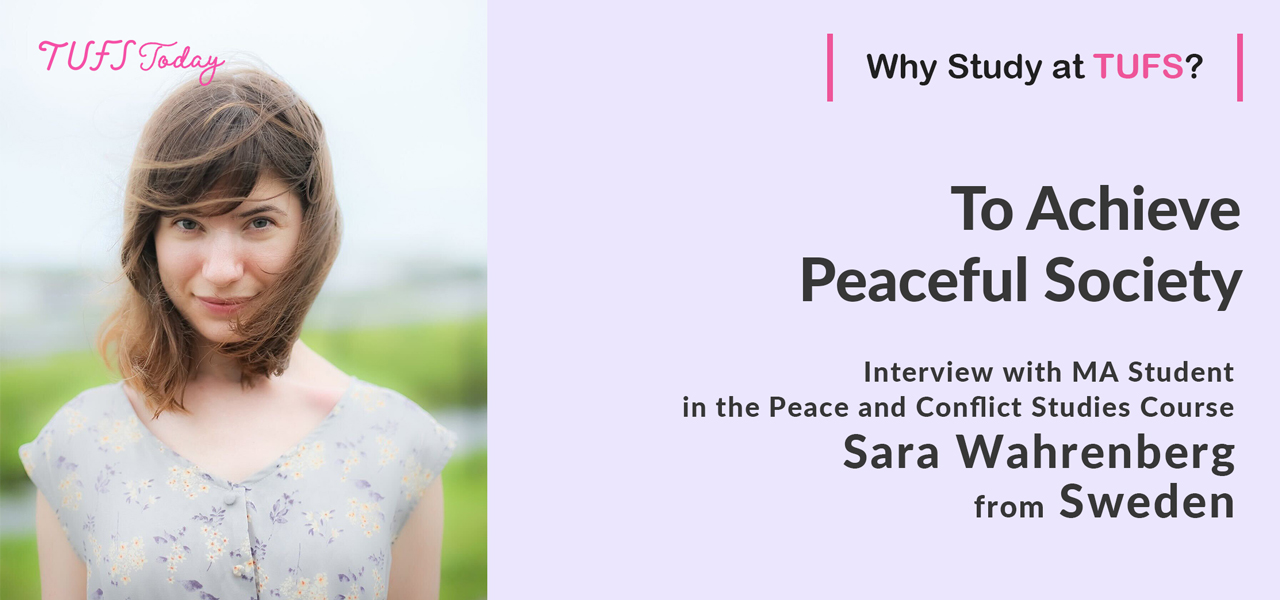
In 2004, the Program: Peace and Conflict Studies Course (PCS) was established at the Graduate School of Tokyo University of Foreign Studies. This program offers all courses in English to foster experts engaged in peace-building and conflict prevention. The interviewee for this occasion is Sara Wahrenberg, in her second year of the PCS master's program. This is her third time studying in Japan. Through the interview, we will delve into her background, exploring how she became proficient in Japanese and why she decided to pursue graduate studies in a distant country, Japan.
Interviewer:Ms. Hori UTA, 2nd year student, English Major, School of Language andCulture / Student Reporter of TUFS PR Management Office
Study at TUFS
––– What brought you to Japan?
When I borrowed "DRAGON BALL" from my cousin during elementary school, it sparked my interest in Japan. Initially, I simply enjoyed Japanese manga, but eventually, I started listening to music by "Morning Musume," which I found in a magazine. During my middle school years, I frequently listened to J-rock and so-called V-kei bands
My journey of learning Japanese began with self-study using the internet. In middle school, I started taking Japanese classes once a week at an external institution. In high school, I studied abroad in Kumamoto Prefecture for a year. Since no students spoke Swedish or English around me at the time, I immersed myself in Japanese. I believe that experience greatly contributed to my improvement in the language. After entering university, fueled by the desire to go to Japan again, I studied at this university as a Japanese Studies student for ten months. After graduating from a university in Sweden, I decided to pursue graduate studies at TUFS.
–––What are you studying at TUFS?
I am enrolled in the Master's program in Peace and Conflict Studies Course. I am broadly studying international relations and peacebuilding theories. Recently, I have been focusing on the rise of right-wing populism in current Europe and conducting research based on online postings. While I can identify the reasons behind the popularity of populism, preventing the spread of such ideologies is an extremely challenging task.
–––Please, tell us about a goal after graduation or studying abroad.
Actually, I am busy looking for a job in Japan! I am aiming to work for a foreign-affiliated Japanese company and, after working in Japan for some time, I am considering returning to Sweden or moving to another country to engage in work related to international relations. My goal is to leverage my proficiency in Swedish, English, and Japanese to make a global impact.
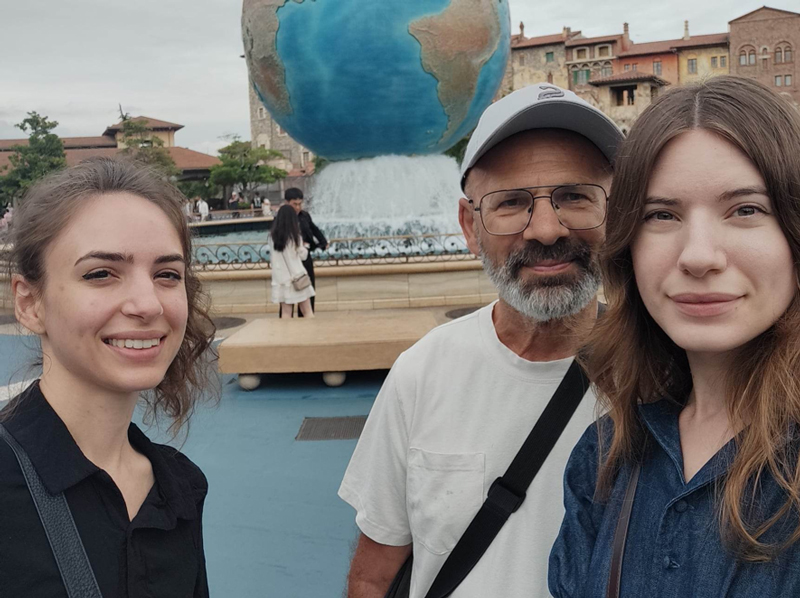
Life in Tokyo
–––What do you usually eat or cook?
I rely on supermarket bento boxes and side dishes, or cook my own meals, depending on the day. When I cook at home, I usually cook Western-style dishes since I'm not familiar with how to use Japanese seasonings. In fact, Swedish people rarely cook traditional Swedish cuisine, so I often make typical Western dishes like soups and pasta. As for Japanese food, I'm not fond of bitter melon (goya) and slimy textures like natto, okra, and yam, but other than that, I generally enjoy eating them. My favorite Japanese food is sushi, and I sometimes eat it in Sweden as well.
–––Please, tell us about your club activities or part-time job.
Since entering graduate school, I had worked part-time in a supermarket, restocking shelves. However, starting this year, I have been teaching English classes in the shared house where I live. The share house accommodates around 60 people of various ages. During the classes, we watch YouTube videos and study English vocabulary or expressions in videos. Around six people gather for the classes once a week, and I try to make the learning process enjoyable.
I am not a member of any club, but when I came to Tokyo as a Japanese Studies student, I joined a tea ceremony club. I chose the club because I just liked tea, but unfortunately, our activities didn't go as planned due to the outbreak of the COVID-19 pandemic. However, during the University school festival (Gaigo-Sai), I had the opportunity to wear a kimono and serve tea, which was a memorable experience.
–––How do you spend your free time outside of school?
I often spend my days off with friends. We go out to eat, go to karaoke or bouldering. When I'm alone, I relax by watching movies or listening to music. I have a lively curiosity for everything so I often listen to podcasts to gather information from various fields. In particular, I frequently listen to a podcast called "Ologies," which provides information on various academic disciplines.
I also like to go on trips during my days off. Since I love nature, I often visit places like Okutama and Mount Takao. Furthermore, I traveled to Hokkaido last summer, and this year I am planning a trip to Okinawa.
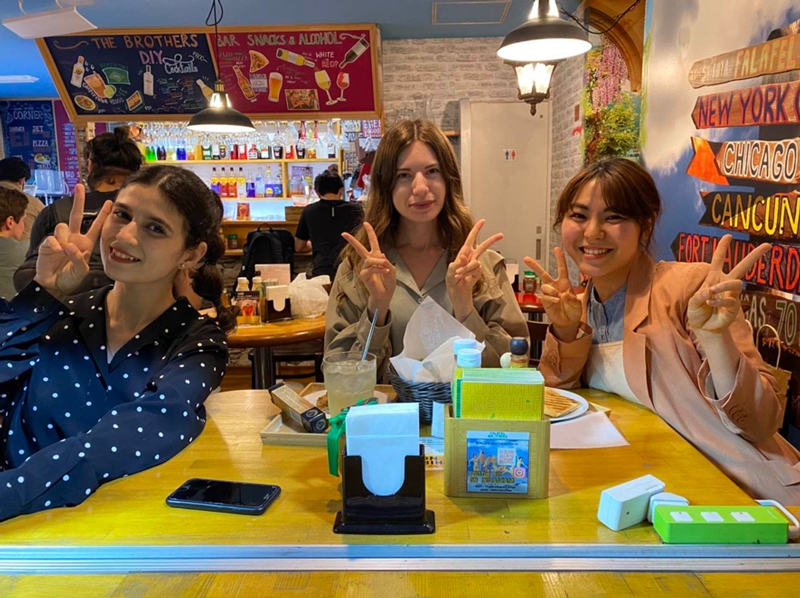
Me and Japan, a changed habit
–––What do you like to buy for your friends or family when you go back to your home country?
I often buy snacks as souvenirs. Japanese snacks have a wide variety of flavors and types, and my family and friends like them. I personally enjoy wagashi (Japanese traditional sweets), especially Kyoto's Yatsuhashi. Swedish people have different preferences, though. At first, I didn't like “anko” (Japanese sweet bean paste) and wondered why beans were sweet, but I've grown accustomed to it and now I like it. For friends and my sister who are interested in Japan, I sometimes bring character-themed snacks like Pokémon. Besides food, I have also bought socks with flashy patterns as souvenirs.
–––Where in Japan do you recommend?
I have a lot of recommended places, but one place that I particularly like and holds deep memories is Kumamoto Prefecture. It's where I stayed when I first came to Japan as a high school student. It's not a big city, but the food is delicious, and the people are kind. Another recommendation would be Enoshima in Tokyo. It has fantastic seafood restaurants and beautiful glassware shops. It's a wonderful place where you can enjoy nature.
–––Are there any (your) habits that have changed since you came to Japan?
I've adopted the Japanese way of communication. For example, I find myself bowing to even the smallest things. Also, when I return to Sweden, words like "gomen" (sorry) and "sumimasen" (excuse me/sorry) come out spontaneously. I feel like the word "gomen" is used quite often in daily life compared to Swedish. It's more of a reflex than a genuine apology, right? I guess I've become accustomed to that habit as well.
Moreover, living in Japan exposed me to many differences in thinking and values, and through such experiences, I've come to deeply contemplate diversity. As a specific example, the hierarchical society in Japan is a system that doesn't exist in Sweden. I strongly feel it, especially during job hunting. It was surprising to me at first that suits are required for interviews and that there are regulations regarding hair color and makeup, which would be unthinkable in Sweden. Living abroad, you're bound to encounter differences in values that can be challenging or hard to accept. However, instead of simply rejecting those differences as “wrong,” acknowledging that such perspectives exist contributes to personal peace and stability. Through studying in Japan, I've become more open-minded in embracing various ways of thinking.
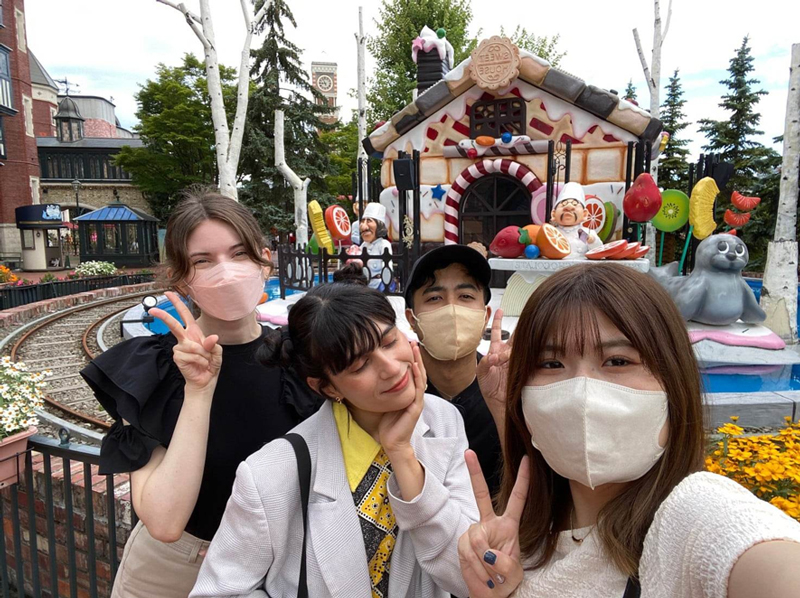
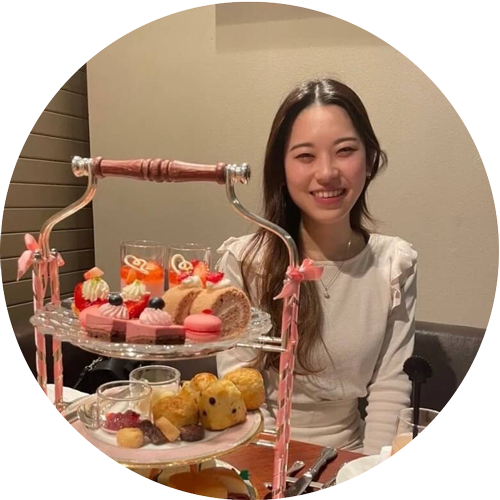
After the Interview
I received positive energy from Ms. Sara, who was flexible and accepting that there is such a way of thinking, rather than giving up on mutual understanding because of differences in culture and values. The word "peace" is easy to say, but not so easy to achieve. I would like to think about what we can do now to realize peace, starting from our immediate surroundings.
Uta HORI, 2nd year students, School of Language and Culture Studies
本記事は本学の「学生取材班」により準備されましたが、文責は、東京外国語大学にあります。ご意見は、広報マネジメント・オフィス(koho@tufs.ac.jp)にお寄せください。

